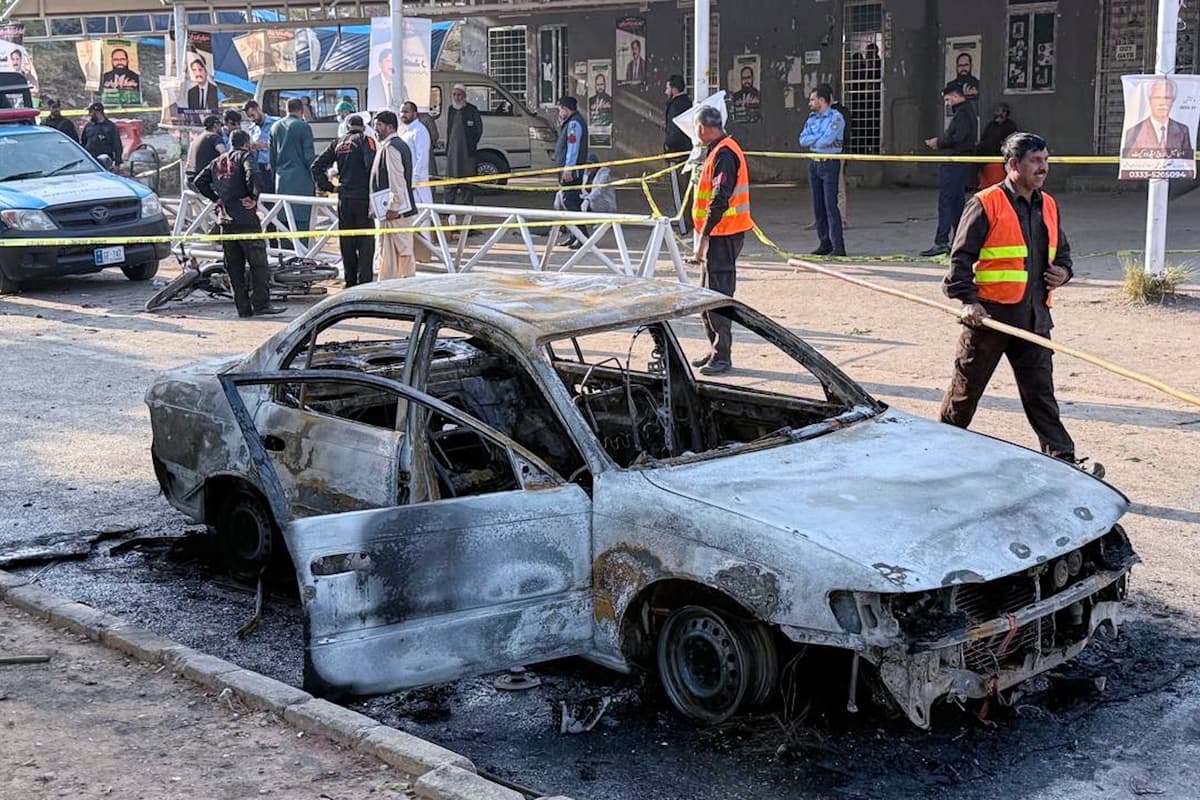Trump Signals a New Eagerness — Finally — To Repair Relations With India
Two terror attacks, one in Delhi, the other in Islamabad, could complicate an entente.

With President Trump apparently eager finally to repair America’s rocky relations with India, two terror attacks — one at New Delhi and one at Islamabad — could complicate his efforts and usher in renewed hostilities in south Asia.
Mr. Trump hinted on Monday at removing sanctions from India. That was at a White House swearing-in ceremony for the new ambassador to Delhi, Sergio Gor. Eight persons were killed on the same day as a car bomb detonated in the heart of the Indian capital. On Tuesday, another car bomb exploded at Islamabad in neighboring Pakistan, killing at least 12 people.
After a local terror group claimed responsibility for the Islamabad attack, the Pakistani defense minister declared his country to be in a “state of war.” Tensions on the Pakistani border with the Taliban-ruled Afghanistan have long simmered, and now Islamabad has accused New Delhi of raising those tensions and clandestinely backing the Pakistan-based Tehreek-e-Taliban, which claimed credit for the Tuesday bombing.
“Both India and Pakistan believe that the terror attacks against them are sponsored by the other,” the Afghanistan-born former American ambassador to the United Nations and special envoy to Afghanistan reconciliation, Zalmay Khalilzad, tells the Sun. As Delhi-Islamabad tensions rise, “the probability of a return to war between them is increasing.”
India, the world’s most populated country and its largest democracy, denies any involvement in terrorism. Pakistanis “straight away blame India, and they say that the Taliban is acting as a proxy of India, and nothing could be further from the truth,” the executive editor of the Hindustan Times, Shihir Gupta, tells the Sun. “This may be the state of play that Pakistan does. India does not do these things.”
Like several other terrorist groups operating in South Asia, Mr. Gupta adds, Tehreek-e-Taliban once was the “baby” of Pakistan’s intelligence services, even though it is now “at loggerheads with the Pakistan Army establishment.” Meanwhile, he adds, evidence on the Monday car bombing at Delhi points to involvement of the Pakistan-based terror group Jaish-e-Mohammed.
Mr. Trump raised eyebrows at Delhi when he claimed to have secured peace between India and Pakistan in May. The four-day war between the two nuclear armed countries followed a deadly terrorist attack on Indian tourists at Indian Kashmir and was widely seen as a threat to the region and beyond.
Delhi maintains it decided to stop the hostilities on its own, and that Mr. Trump’s main contribution was to convince Islamabad to do the same. Indians were further angered when Mr. Trump made warm and friendly gestures toward Pakistan and turned his back on Delhi, which sees itself as a truer American ally.
Mr. Trump made a trade deal with Islamabad to secure American rights to mine rare earths in Pakistan. In September, he warmly greeted Prime Minister Shahbaz Sharif and the Pakistani army chief, Field Marshal Asim Munir, at the White House.
At the same time, Washington slapped a 50 percent tariff on Indian goods on top of existing tariffs, citing Delhi’s purchase of Russian oil. Mr. Trump declined to similarly punish Communist China, which buys even more Russian oil than India.
The president often highlights his personal friendship with Prime Minister Narendra Modi, but many Indians were insulted by what was seen as favoring Pakistan. “Right now, they don’t love me, but they’ll love us again,” Mr. Trump said Monday during Mr. Gor’s swearing in ceremony at the White House.
The Senate confirmed Mr. Gor’s appointment in October as ambassador to India, ending a vacancy at Delhi dating back to Mr. Trump’s return to the White House in January. In addition to being ambassador, the long-time Trump associate and business ally will serve as special envoy to south and Central Asia.
The new ambassador is “already friendly” with Mr. Modi, so he is “going to have a great success of it,” Mr. Trump said Monday, adding that “it’s a very important relationship,” as India boasts “the fastest growing middle class, and it’s an important economic and strategic security partner in the Indo-Pacific region.”
Meanwhile, Mr. Trump said, “We’re pretty close to doing a deal that’s good for everybody.” Indians have long said that an agreement to boost trade with America would help repair tensions. Mr. Modi has been more friendly to America than all his predecessors, and India is increasingly seen as an Asian bulwark against Communist China’s expansionism.
“What I have been told is that a positive equilibrium is soon going to be reached,” between India and America, Mr. Gupta says. “Now it all depends on President Donald Trump.” And the appointment of Mr. Gor, who is close to the president, is “going to be positive.”

